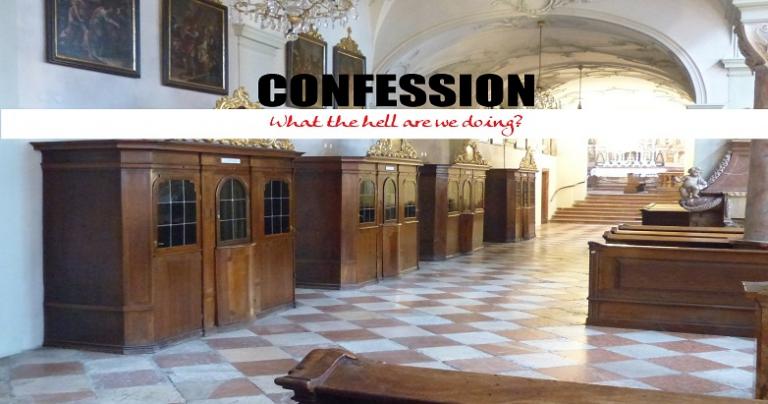
Got a question for you. Jesus is disclosed in the sacraments, yes? Hope the Catholics said yes, as that is Church teaching. Perhaps a better question is—what kind of Jesus is revealed in the Sacraments? What kind of Jesus is communicated in Penance or Reconciliation?
Recall a previous post where we discussed the intelligibility of the sacraments. Sacraments cause grace insofar as they signify it. Should they be unintelligible or rendered ineffective as signs, the result is they won’t be effective causes. For a sacrament to be effective, it must be intelligible.
What then is the intelligibility of Penance or Reconciliation, what we call “a sacrament of healing”? Is Jesus being disclosed as one who forgives and heals? Or do we present him as the Impossible One who demands his followers be clean and worthy enough before daring to approach his Presence? And if the latter, how does such an image correspond with the Jesus of history and his project?
Watch the video here—
Jesus the Healer, Source of Penance
To prepare his fellow Israelites for immanent Theocracy, Jesus forgave sins and healed the sick. Thus the Gospels link both forgiveness and healing. But sin in the Bible means to shame or dishonor God. However our theology of sin is highly evolved, bearing 2,000 years of theological freight. Therefore in Catholic understanding, sin has come to mean any deliberate rejection and opposition to the will of God. These two different understandings are not incompatible—just note that the first originates from the honor-shame cultural world of the Bible and Jesus. Westerners belong to a guilt-culture and thus can’t really think that way.
Healing in the Bible is distinct from curing in our 21st-century Western world. Sickness is universal. Therefore this misfortune in human health and well-being is a panhuman condition. But different cultures interpret sickness differently. Consequently, the cultural world of the Gospels interprets sickness as a disvalued state of being in which social networks have been disrupted and human meaning lost.
In contrast, our biomedical culture interprets sickness as disease, a biomedical malfunction afflicting an organism. These two cultural interpretations are very different! And this is not merely a matter of semantics!
Our culture fights disease by seeking cures. Think about our current pandemic and desperately needed vaccines. A cure is the elimination of disease or the repair of the biomedical malfunction. In contrast, the cultural world of Jesus, the folk-healer (as opposed to Western Medical Professionals), seeks healing. Healing refers to the restoration of meaning and wholeness to human life.
Penance in Cultural Contrasts
The cultural world from which our Church comes, out of which grew its seven sacraments, is the world of illnesses and healings, not diseases and cures. Sin disrupts life (the way Fredo disrupts the Corleone Family) and brings death to individuals and communities. Healing restores life and meaning.
Ours is an innovative culture that prides itself on cleverness. So clever we are, and so proud, we suffer from a surplus of hubris. We are good at fixing things, but not so good at finding meaning in life. Cures are elusive even in our cultural world, but they sometimes come, and diseases do get fixed or rendered manageable. But when we enter the hospital, we go as a number, and exit as a number, with a bill. But where is the meaning? We 21st-century Westerners are starved for meaning.
Intelligibility of Penance
What meaning is being given through the sacrament of healing called “Penance” and “Reconciliation”? Where is the meaning in our parish communities? When Father knows me more by my envelope number than who I am, what kind of Christ are we communicating?
By the way, having been a shamanic folk-healer doesn’t mean the prepaschal Jesus wasn’t the Second Person of the Trinity, ok? It doesn’t mean the Church is wrong in its estimation of him. It just means we must take seriously the “in” of Incarnation.
Jesus’ ministry was all about healing. How about his Church? How are we restoring meaning to people’s lives? And how is Reconciliation communicating this essential gift?
Penance Unintelligible
For many, the Sacrament of Penance makes no sense at all. To a significant number of Americans, seeing the weird celibate man in the dress in the fancy Church closet isn’t communicating healing. Why should I go and confess my sins to a priest? You hear this all the time, even from Catholics at Church every Sunday. There is no integration. Everything is disjointed, nebulous. Incessantly asking for money? There we are batting a thousand.
Yes, donations are needed, and Catholics in many places are notorious for stiffing their parishes. But hey bishops! If COVID-19 times are tough, maybe cut down on the gala dinners? Perhaps sell the mansion, or the Buick and motorcycles. Possibly decimate your battery of lawyers set up to protect your interests and greed. Maybe thin out those 401ks just for a while, “shepherds.”
Evolution of Penance
The early Jesus groups gave a Penance-like healing only once following Baptism. The Shepherd of Hermas (ca. 150) indicates this post-baptismal forgiveness was going on. But they only administered this one time. The whole Jesus group would participate at the bedside of the sick person. By the way, “Catholic priests” were still evolving by this point—shhh! Don’t tell the stormtroopers of orthodoxy in your parish or seminary!
In these early Mediterranean days, as in Biblical times, “sin” meant dishonoring God. All sickness was understood as being the effect of a personal cause. God made me sick! What did I do to shame him, our (Mediterranean) Patron? It’s evident I dishonored God because I suffer from illness, and everyone sees me shamed by it.
The Effects of Shaming God
Despite Western ethnocentrism in modern Bible translations, psychological guilt is nowhere in the Bible, including Psalm 51. Biblical people, unlike Americans, were anti-introspective. What translators often mistake for psychological guilt was really the physical deformity of sickness, “bodily crookedness,” that brought dishonor to the Psalmist. The gods have cursed us. Why? Sin—we have offended their honor, i.e., we have shamed them. That’s the Mediterranean cultural background of many a psalm and lamentation.
It goes right into the New Testament, folks. In effect, sickness broke up the Jesus group, and this sickness must have been caused by my shameful acts, so Paul and others after him believed.
Penance: Continuity within Evolution
If you want to bring up John 20:22-23, please do so in context, because a proof-text without context is a pretext. We enjoy ripping texts bleeding out of context, don’t we? We tie that passage up in a pretzel with Matthew 16:19 and 18:18. None of these passages separately, or sewn up together via Frankenstein-splicing eisegesis, proves that Jesus instituted the sacrament of Penance familiar to us. Sorry, Karl Keating!
Nor does it prove that Jesus transferred powers onto Apostles and their successors to continue this with exact blueprints, matter, and form. The Gospels are not transcripts of what Jesus actually said, especially the Fourth Gospel called “John.” Let’s put down our antiquated Baltimore Catechisms.
Nevertheless, as I said, Jesus was all about healing and forgiveness of sins (Mark 2:5–12; Matthew 9:2–8; Luke 5:20-26, and one should expect his Body to be likewise inclined. “Luke” recalls that the Jesus groups persisted in the forgiveness of sins in preaching (Acts 2:38; 5:31; 10:43; 13:38; 26:18).
Penance Says What About the Church?
Going back again to the intelligibility of the sacraments, what does Penance disclose about the Church? Is it just that she is some kind of machine that cleans up sinners? Are priests sacramental vending machines? Or could it be instead that the Church is a community that always needs Reconciliation?
Thank God that the Church is not the same yesterday, today, and forever. Christ maybe, but not his Church. Consider the following questions from the old Baltimore Catechism—
QUESTION 584:
Does the outward sign merely indicate that grace has been given or does the use of the outward sign with the proper intention also give the grace of the sacrament?
ANSWER:
The outward sign is not used merely to indicate that grace has been given, for the use of the outward sign with the proper intention also gives the grace of the sacrament. Hence the right application of the outward sign is always followed by the gift of internal grace if the sacrament be administered with the right intention and received with the right dispositions.
QUESTION 581:
Do the Sacraments recall in any way the means by which Our Lord merited the graces we receive through them?
ANSWER:
The Sacraments recall in many ways the means by which Our Lord merited the graces we receive through them. Baptism recalls His profound humility; Confirmation His ceaseless prayer; Holy Eucharist His care of the needy; Penance His mortified life; Extreme Unction His model death; Holy Orders His establishment of the priesthood, and Matrimony His close union with the Church.
Where is the Healing??
Focus on what Penance recalls according to the Baltimore Catechism—Jesus mortified. In other words, our sins are like Mel Gibson’s flagellation scene in The Passion of the Christ. Say I get angry and randomly drop the f-bomb. Basically, I am morally equivalent to Mel Gibson’s torturers of Christ. Oh, let’s tighten up the cilice and set the WABAC machine to the Golden Age of the 1950s!
Where is the healing being signified? According to the Baltimore Catechism, Penance recalls Jesus as a bloody mess, and Anointing of the Sick (Last Anointing!) remembers Jesus as a bloody mess dead. Consequently, no healing there!
Therefore, watch how you theologize when considering how often one should confess? In other words, how healthy is our theology? Ultimately, that speaks to the intelligility of the Body of Christ.
In my last job, I coordinated religious education and arranged many activities for youngsters in sacramental prep. But I wondered—why are we forcing second-graders to confess their “sins”? Forgive me, but I am skeptical about the pastoral wisdom (or sanity) there. The same thing goes for demanding that Penance be a precondition for the reception of First Eucharist. What do such ridiculous disciplines do to the intelligibility of Christ?
More later…












